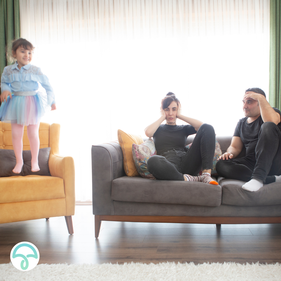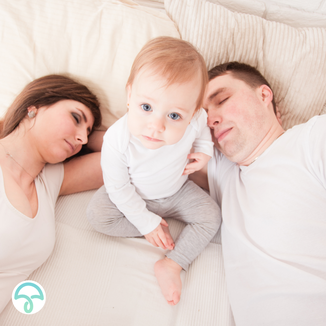What is parental burnout? 3 Symptoms + Tips for parents To be honest, parenting is really hard work. Imagine what would happen if parenting conditions were actual working conditions: waking up in the middle of the night because your boss needs you to deliver a project "right here, right now." Or imagine that your boss is satisfied or unsatisfied with your work but in an unpredictable way. One day they say, “Well, I like what you're doing”, and the next day “I hate it and you're not trying enough!" - imagine working long hours with no salary and actually not knowing what your time schedule or the deadline of a project is. So, if we put this whole parenting situation into a different context and compare it with actual working conditions, it is huge and, maybe at some points, very inhuman. What is burnout?First of all, when we are talking about parental burnout, we are not only talking about house chores and family responsibilities. It’s more complicated than that. First, let me explain what the main symptoms of burnout are in general before we dig into parental burnout. The official definition of burnout according to the WHO's ICD-11 is: Burn-out is a syndrome conceptualized as resulting from chronic workplace stress that has not been successfully managed. It is characterized by three dimensions:
3 Symptoms of parent burnoutSo, now let’s adapt the same symptoms but in the parenting and family context. 1. Exhaustion The parent is feeling physically and emotionally exhausted. This is the result, of course, of sleep deprivation, the accumulation of too many responsibilities, homeschooling (especially now with the pandemic), and trying hard to meet all the needs of their children and at the same time neglecting (or even having zero time) to take care of their own (basic) needs. 2. Emotional distance Secondly, the parent feels emotionally distant from their children, they don't feel connected. Sometimes, they don't even enjoy parenting anymore. They lose the sense of joy in parenting. They play with their children, but they are not mentally or emotionally present; it’s the opposite: they feel mentally and emotionally empty. 3. Ineffective The parent feels the sense of being ineffective, the sense that they are doing a lousy job as a parent. Τhe reason behind this parental burnout is said to be the imbalance between the demands of being a parent and the rewards of being a parent. And I totally agree with that. But I will also add an extra element, which goes a little bit deeper into a parent’s mindset: guilt. A common feeling: Guilt There is a lot of guilt in saying no to some of the parenting demands and saying yes to some well-deserved rewards because a parent feels that this is what being a mother or a father means: to not ask anything in return, and therefore one shouldn’t nag about it, or complain about the struggles of being a parent. This is guilt about admitting that one struggles, this is guilt in asking for help, this is guilt in admitting mistakes, fears, vulnerability. So, one can see that this guilt leads to not only further emotional struggles, but it also leads to a bigger effect: parental burnout, a well-kept secret that no one dares to admit and ask for help for. And the more we ignore it, the less support there is for parents and the more lonely and isolated they feel in their struggles. Related:Consequences of parental burnoutThe consequences of parental burnout can be:
Related:What is the message that we give our children? I would like us to think of what kind of message the kids get when they see their parent collapse. Do they get the message that this is love that generates more joy and love, or do they get a conflicting message that love entails suffering and it’s not necessarily a happy feeling? Do they get the message that taking care of someone else is nice, or that care is something that happens at the expense of the carer’s health? Do they interpret that their parent is suffering because of them, and therefore they try to ask as little as possible in order to protect the parent? What do they learn about boundaries, about self-care, about responsibility? What kind of message do they get? Is this the beginning of a perfectionistic or avoidant mindset? How are they going to translate that message into their relationships in the future, and how burned-out will they be if they do the same thing that their parents are doing at the moment? Related:How to avoid and cope with parent burnoutIn order to deal with, prevent or recover from burnout, first, we need to talk about it. We need to allow the parents to come out and talk about the elephant in the room. Of course, a big part of burnout recovery is self-care and paying attention to one’s own personal needs. But before we establish some self-care for parents who are struggling with parental burnout, let's talk about priorities. If the parent has been working all day long, and on top of that, the pandemic is adding homeschooling and extra responsibilities on their shoulders, how important is it to have a shining clean house, homemade cookies, ironed clothes, or homemade cupcakes for the school treat? Maybe it is important. But if, in order to do those previously mentioned tasks, the parent sacrifices the little amount of energy that was left in them, and there was none left for cuddles, quality time, having fun and connection with their kids, then I would question these priorities. Because I've heard that a lot. I've heard people pay a lot of attention to having the practical sides of family life intact, but at the same time, the emotional connection with their children is almost non-existent. They feel no joy, they don't connect with them. Their mind is somewhere else. They have no time left for them. So, let's shift some priorities. What do you think is important in your family? Cupcakes, a clean house and lunch boxes that no one will remember, or cuddles, fun and joyful memories that your kids will cherish forever? Burnout is not the absence of time or energy. Burnout is the result of time imbalances and misplaced energy over confused priorities. Dear parents, remember: you are not alone. What's Next?
0 Comments
Your comment will be posted after it is approved.
Leave a Reply. |
Therapy |
|
